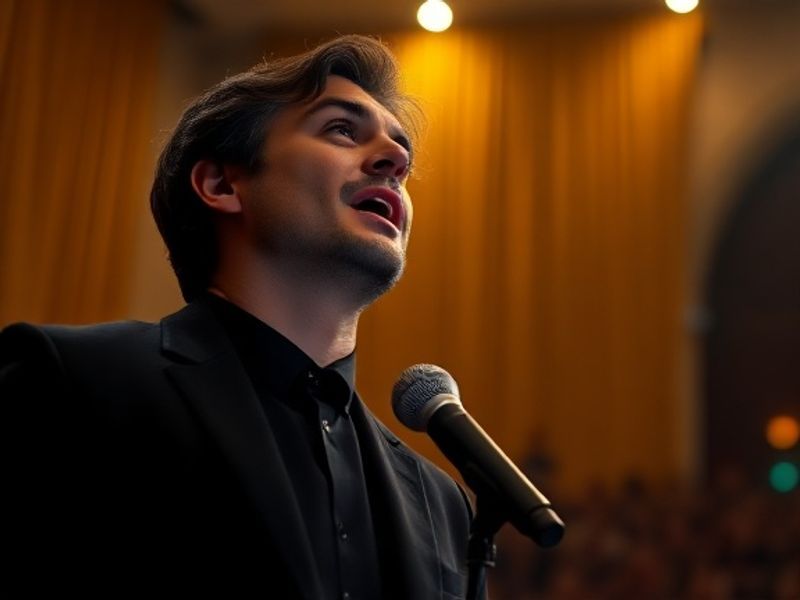Matteo Bocelli: The Last Romantic Export in a Post-Truth Trade War
Matteo Bocelli and the Empire of the Second-Generation Croon
By Our Man in the Eternal Lounge, Nursing a Negroni and Existential Dread
Florence, late afternoon—sunlight drips off the Arno like melted gelato, and Matteo Bocelli is trying very hard not to look like he’s auditioning for his own surname. At 28, the younger Bocelli has stepped out from behind the paternal shadow so large it once eclipsed a World Cup closing ceremony. Now he stands at the intersection of Old-World bel canto and the algorithmic monoculture that decides what the planet hums in the shower. The stakes? Only the future of sentimental balladry in an age when TikTok compresses Puccini into fifteen seconds and a drone strike can be ordered between choruses.
International audiences—those still bothering to separate Spotify playlists from state propaganda—treat Matteo as a test case: can soft power survive when every border is porous and every earbud a potential surveillance device? China’s Tencent has already pre-cleared his upcoming Mandarin single for 1.4 billion potential ringtones. Meanwhile, the European Commission, ever eager to regulate oxygen itself, is drafting guidelines on “emotional decibel caps” for streaming platforms; Matteo’s velvet mezzo might soon require a health warning in Scandinavia. All of this, mind you, for a man whose first public performance was at age three, singing “Jingle Bells” in a tuxedo that cost more than the average Tuscan wedding.
The cynical among us (hello) note that nepotism, like carbon emissions, is simply outsourced these days. Matteo’s debut album, aptly titled “Matteo,” was produced by a committee that includes one ex-Spotify data scientist whose job was to ensure at least three tracks could be remixed into lo-fi beats to study fascism to. The record debuted at No. 1 in 23 countries, proving that nostalgia is the only export Europe still manufactures without Chinese rare-earth metals. Critics call it sonic gentrification: timeless melodies repackaged for the AirPod proletariat. Fans call it comfort food for the soul. Investors call it a 340 % ROI in under eighteen months—beating both wheat futures and small-arms shipments to whichever proxy war is fashionable this quarter.
Yet beneath the strategic tear-jerking lies a genuinely curious specimen. Matteo speaks fluent English, Italian, and the universal language of brand synergy. He can pivot from Verdi to a Dua Lipa duet without popping a vocal cord or an NDA. During a recent 12-hour layover in Dubai—where else?—he livestreamed an acoustic set atop the Burj Khalifa, the world’s tallest metaphor for leveraged real estate. Comment sections melted in real time: Argentinian grandmothers wept, Korean crypto bros tipped Bitcoin, and some enterprising soul in Belarus synced the feed to a protest against compulsory conscription. Soft power, meet hard times.
Of course, every empire needs its barbarians. Indie labels from Lagos to Lima now market “anti-Bocelli” playlists: raw vocals, no Auto-Tune, lyrics about inflation and antibiotic resistance. Streaming numbers remain modest, but the symbolism stings—proof that even sentimentality has a counterculture. Matteo, ever the diplomat, responded by sampling Afrobeat in his next single, thereby colonizing the backlash before it colonizes him. The circle of life, sponsored by Universal Music Group.
What does it all mean for the average Dave’s Locker reader, currently doom-scrolling in a stained bathrobe? Simply this: the planet’s emotional bandwidth is finite, and the fight for it is as ruthless as any oil pipeline dispute. Matteo Bocelli offers the illusion that beauty still transcends borders, currencies, and drone altitudes—an illusion expertly monetized, shrink-wrapped, and delivered next-day via Amazon Prime. Consume cynically, but consume quickly; tomorrow the algorithm may decide that Mongolian throat metal is the new balm for global anxiety.
In the meantime, Matteo will spend the summer doing stadium tours where ticket prices scale according to local GDP per capita. He’ll close each night with “Fall on Me,” the syrupy duet with his father that has become the unofficial anthem of intergenerational emotional debt. Somewhere in the dark, a state functionary will note the decibel count and file it under “Non-Tariff Cultural Influence.” And we—jet-lagged, vaccine-scarred, chronically online—will hum along, because the alternative is silence, and silence, as always, terrifies us more than any high C ever could.







